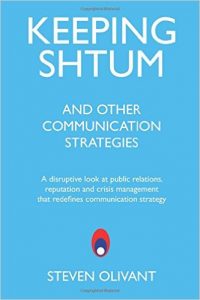Keeping Shtum: Book review

About the author
Richard Bailey Hon FCIPR is editor of PR Academy's PR Place Insights. He teaches and assesses undergraduate, postgraduate and professional students.

‘When you softly collide with another pedestrian in the street, do you:
- Stop all passers-by to witness the scene, apologise loudly and lengthily, solemnly undertake never to bump into anyone again, and offer the victim generous compensation.
- Threaten to complain to the media or sue the other party for assault.
- Say excuse me or sorry, smile, and walk on.
And which of these do you expect from the other party?
There is a widespread view that when an organization meets a crisis, the best course of action is to highlight it – to get out in front of the problem and over-react to it.’
This gives a flavour of why Steven Olivant’s book is such a bracing – and brilliant – read. Here’s a senior practitioner who has studied public relations to MSc level and who cites academic sources (there are over twelve pages of single spaced reading and many hundreds of footnotes) yet finds them wanting.
Crisis communication is one of those frustrating areas that’s so easy in theory – and yet so hard in practice – which leads to a glaring gap between the classroom and the boardroom.
The three main thrusts of his critique are that communicators talk about transparency and tend to espouse open communication, ignoring the importance of ‘keeping shtum’. That taking a stakeholder view of the organisation leads to a lack of strategic focus as you can’t possibly keep all the people happy all the time. And that what passes as strategy in the textbooks is in reality campaign planning.
Central to his argument is that public relations scholars have a blind spot over Apple. The obsessive, secretive, controlling corporation that is the most profitable business in history is often claimed as a marketing success story – but is absent from most public relations textbooks. And he’s right: Apple is the antithesis of the open systems approach long advocated by public relations scholars.
When two smart practitioners posed the paradox of Apple in their 2008 book Crowd Surfing, David Brain and Martin Thomas could only propose that Apple was the exception that proves the rule.
Olivant goes further in seeking to make Apple a communications exemplar. Being secretive is part of its competitive strategy, an important prelude to the ‘big bang’ launch events. So his book starts with the iPad launch in 2010 in which he recalls the real-time mockery of those who thought the product reminded them of feminine hygiene products (‘what about notepads?’ he counters.)
Better, he’s a long enough memory to recall the Apple Newton, a precursor product that failed because its ambitions went beyond the capabilities of the technology at the time.
The author has worked in several prominent corporate communication roles for several contentious industries (oil and gas, transport and travel) and his best case studies are not Apple, but BP (Deepwater Horizon), airport expansion (Heathrow v Gatwick) and Costa Concordia.
He argues that the last was a win for parent company, Florida-based Carnival Cruises which was able to limit the damage to its reputation and share price, and that the first was a strategic success for BP which survived the escalating liabilities and public opprobrium that would have killed a weaker organisation. Clearly there were casualties (up to $50 billion of shareholder value lost, as well as then-CEO Tony Hayward’s job), but BP lives on. Its directors had a duty to protect the interests of BP’s employees and shareholders, while accepting responsibility for the loss of life and the damage to businesses and the environment.
The point that Olivant makes is that deep sea drilling is risky. The problems in the Gulf of Mexico were not communications failures, and there were no easy communications solutions. Don’t trust the textbooks!
No risk, no reward as people say in business. No friction, no need for PR suggest the textbooks. So let’s not pretend we’re living in the Garden of Eden.
If some scholars are keen on postmodern perspectives on public relations, Olivant gives us a post-lapsarian world view. The book is about winning in a competitive landscape.
This leads me to my critique: it’s a very masculine world view. The heroes are generals and a male cast of chief executive and chief financial officers. Jane Austen is quoted a couple of times, Margaret Thatcher just once. Otherwise this is a man’s world!
This view has historical validity but it does not represent comms practitioners (females outnumber males), nor a political cast that includes Angela Merkel, Theresa May and Hillary Clinton.
And this self-published book on CreateSpace (printed on demand by Amazon) is not a handsome publication. A proper editor would have sorted out the hyphenations and the justified text of some titles, and addressed the referencing. It’s there and it’s very extensive, but it’s not always easy to identify the sources.
I’ll end with one paradox that the author might enjoy. How did I discover this book since I don’t know him and he’s not active on social media? I ordered if having received an attention-grabbing email from the publishing team. This contained a set of slides based on the book (useful to a lecturer like me) and intrigued me enough to buy the book.
Clearly, keeping shtum is a valid communications strategy – but it’s not a universal principle. There are times to speak up and shout out.
Businesses are from Mars & Scholars are from Venus
Keeping Shtum And Other Communication Strategies
By Steven Olivant
CreateSpace, 2016, 474 pages